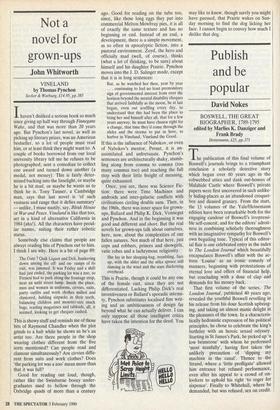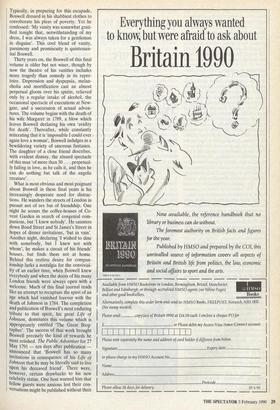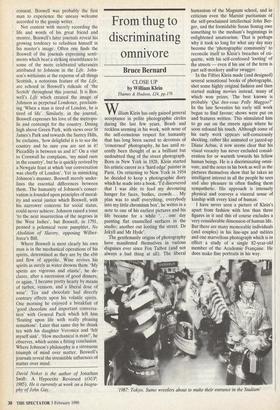Publish and be popular
David Nokes
BOS WELL, THE GREAT BIOGRAPHER, 1789-1795 edited by Marlies K. Danziger and Frank Brady
Heinemann, £25, pp.37I
he publication of this final volume of Boswell's journals brings to a triumphant conclusion a scholarly detective story which began over 60 years ago in the cobwebbed attics and dank out-houses of Malahide Castle where Boswell's private papers were first uncovered in such unlike- ly hiding-places as an abandoned croquet- box and disused granary. From the start, the 13 volumes of the Yale/Heinemann edition have been remarkable both for the engaging candour of Boswell's irrepressi- ble self-conceit, and for the editors' adroit- ness in combining scholarly thoroughness with an imaginative sympathy for Boswell's own beguiling tone. Typical of this editor- ial flair is one celebrated entry in the index to The London Journal which beautifully encapsulates Boswell's affair with the ac- tress 'Louisa' as an ironic comedy of manners, beginning with protestations of eternal love and offers of financial help, but concluding with a dose of clap and demands for his money back.
That first volume of the series, The London Journal, published 40 years ago, revealed the youthful Boswell revelling in his release from his dour Scottish upbring- ing, and taking an almost manic delight in the pleasures of the town. In a characteris- tically hedonistic expression of his political principles, he chose to celebrate the king's birthday with an heroic sexual odyssey. Starting in St James's Park, he picked up 'a low brimstone' with whom he performed 'most manfully', having first taken the unlikely precaution of 'dipping my machine in the canal'. Thence to the Strand, where a 'little profligate' allowed him entrance but refused performance, even after his appeal to a crowd of on- lookers to uphold his right 'to roger for sixpence'. Finally to Whitehall, where he demanded, but was refused, sex on credit. Typically, in preparing for this escapade, Boswell dressed in his shabbiest clothes to corroborate his pleas of poverty. Yet he confessed: 'My vanity was somewhat grati- fied tonight that, notwithstanding of my dress, I was always taken for a gentleman in disguise'. This cool blend of vanity, parsimony and promiscuity is quintessen- tial Boswell.
Thirty years on, the Boswell of this final volume is older but not wiser, though by now the theatre of his vanities includes more tragedy than comedy in its reper- toire. Depression and dyspepsia, melan- cholia and mortification cast an almost perpetual gloom over his spirits, relieved only by a regular intake of alcohol, the occasional spectacle of executions at New- gate, and a succession of sexual adven- tures. The volume begins with the death of his wife Margaret in 1789, a blow which leaves Boswell declaring his own 'avidity for death'. Thereafter, while constantly reiterating that it is 'impossible I could ever again love a woman', Boswell indulges in a bewildering variety of amorous fantasies. The daughter of a close friend describes, with evident dismay, the absurd spectacle of this man 'of more than 50. . . perpetual- ly falling in love, as he calls it, and then he can do nothing but talk of the angelic creature'.
What is most obvious and most poignant about Boswell in these final years is his increasingly desperate need for distrac- tions. He wanders the streets of London in pursuit not of sex but of friendship. One night he scours the coffee-houses of Co- vent Garden in search of congenial com- panions, but 'I knew nobody'. He saunters down Bond Street and St James's Street in hopes of dinner invitations, 'but in vain'. Another night, declaring 'I wished to dine with somebody, but I knew not with whom', he makes a circuit of his friends' houses, but finds them not at home. Behind this restless desire for compan- ionship lurks a nostalgia for the convivial- ity of an earlier time, when Boswell knew everybody and when the doors of his many London friends were always open with a welcome. Much of this final journal reads like an attempt to recapture the spirit of an age which had vanished forever with the death of Johnson in 1784. The completion and publication of Boswell's most enduring tribute to that spirit, his great Life of Johnson, dominates this volume which is appropriately entitled 'The Great Biog- rapher'. The success of that work brought Boswell precisely the kind of 'rewards he most relished. The Public Advertiser for 27 May 1791 — ten days after publication — announced that 'Boswell has so many invitations in consequence of his Life of Johnson that he may be literally said to live Upon his deceased friend'. There were, however, certain drawbacks to his new celebrity status. One host warned him that fellow guests were anxious lest their con- versations might be published without their
consent. Boswell was probably the first man to experience the uneasy welcome accorded to the gossip writer.
Not content with merely recording the life and words of his great friend and mentor, Boswell's later journals reveal his growing tendency to refashion himself in his master's image. Often one finds the Boswell of the journals expressing senti- ments which bear a striking resemblance to some of the more celebrated utterances attributed to Johnson in the Life. John- son's witticisms at the expense of all things Scottish, a notorious feature of the Life, are echoed in Boswell's ridicule of 'the Scotch' throughout this journal. It is Bos- well's Life which created the image of Johnson as perpetual Londoner, proclaim- ing 'When a man is tired of London, he is tired of life'. Similarly, in the journal, Boswell expresses his love of the metropo- lis and contempt for the country. Dining high above Green Park, with views over St James's Park and towards the Surrey Hills, he exclaims, 'how delightful it is to see the country and be sure you are not in it! Piccadilly is between us and it!' On a visit to Cornwall he complains, 'my mind rusts in the country', but he is quickly revived by a Newgate feast at which 'our conversation was chiefly of London'. Yet in mimicking Johnson's manner, Boswell merely under- lines the essential differences between them. The humanity of Johnson's conser- vatism is founded upon principles of moral- ity and social justice which Boswell, with his narrower concerns for social status, could never achieve. Johnson raised a toast `to the next insurrection of the negroes in the West Indies', but Boswell, in 1791, penned a polemical verse pamphlet, No Abolition of Slavery, opposing Wilber- force's Bill.
Where Boswell is most clearly his own man is in the mechanical operations of his spirits, determined as they are by the ebb and flow of appetite. Wine revives his spirits as surely as water drowns them. 'My spirits are vigorous and elastic', he de- clares, after a succession of good dinners; or again, 'I became pretty hearty by means of turbot, venison, and a liberal dose of wine'. Tea and chocolate had directly contrary effects upon his volatile spirits. One morning he enjoyed a breakfast of 'good chocolate and important conversa- tion' with General Paoli which left him 'floating upon life with really pleasing sensations'. Later that same day he drank tea with his daughter Veronica and 'felt myself sink'. 'How mechanical is man!', he observes, which seems a fitting conclusion. Where Johnson's philosophy is a strenuous triumph of mind over matter, Boswell's journals reveal the irresistible influences of matter over mind.
David Nokes is the author of Jonathan Swift: A Hypocrite Reversed (0 UP, 1985). He is currently at work on a biogra- phy of John Gay.




















































 Previous page
Previous page